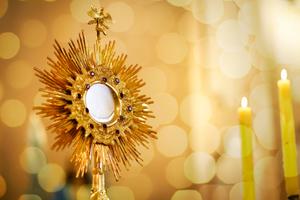Good Reads for Father’s Day
Edgar Guest’s Pro-Dad, Pro-Life, Pro-Family Poetry

“It takes a heap o’ livin’ in a house t’ make it home.”
The above words made Edgar Guest famous, but today’s Catholic families should remember Guest for another reason: His poetry is strikingly pro-life and pro-family. His poems, which are most often penned from the point of view of a husband and father, are particularly appropriate reading for Father’s Day.
Over and over again, Guest extols family life, children and especially babies. Perhaps his most openly pro-life poem is Tied Down, in which he argues with a woman who feels that babies would tie her down. He says, “They fasten you with cords of love / To God divine, who reigns above. / They tie you, whereso’er you roam, / Unto the little place called home. / … The happiest people in the town / Are those the babies have tied down.”
In A Choice, he admits that he finds his children exasperating at times, but he struggles to be patient with them because he recognizes each child is a priceless gift from God.
In What a Baby Costs, Guest describes the sacrifices made by parents, but he concludes, “All this a baby costs, and yet / His smile is worth it all, you bet.”
In The Children, he contends, “The children bring us back to God; in eyes that dance and shine / Men read from day to day the proof of love and power divine.”
He eloquently describes the joy of welcoming a new baby in Home and the Baby, Over the Crib and Sue’s Got a Baby. And, in Childless, he poignantly depicts the heartbreak of infertility, while gently suggesting adoption, as he writes, “And home must be a barren place / That never knows a baby’s face. / Take in a child that needs your care. / Give him your name and let him share / Your happiness and you will own / More joy than you have ever known.”
In No Children, he exclaims, “No children in the house! I fear / We could not stand it half a year. / What would we talk about at night, / Plan for and work with all our might …?”
Although Guest died in 1959, before the birth-control pill became widely available, already he was aware of anti-child attitudes developing in our country — and fought them with the stirring power of his pen.
In addition to Guest’s poems about new babies, he celebrates the sacrifices and joys of parenthood in numerous other works. Parents, especially fathers, will be able to relate to Baby’s Got a Tooth, where a father answers the phone impatiently at work one day — only to hear his wife’s voice on the line sharing the thrilling news.
Guest accurately captures the feelings of a father’s quiet joy in tucking in a Sleeping Child and the dubious pleasure of having his bed invaded in the early morning by energetic Morning Brigands. In Toys, he confesses that he can be self-disciplined with money any time, except “when I’m left in a toy store alone.”
In Whooping Cough, Guest vividly portrays the anxiety a father feels over a sick child, and in Weaning the Baby, he describes a husband’s gentle sympathy for the mixed emotions his wife experiences at that time.
Perhaps most moving of all is Since Jesse Died, which is about a father who is focused less on accumulating wealth and clinging more strongly to his family after suffering the death of his daughter.
Fathers of large families will enjoy The Old-Time Family, in which Guest comments on how modern parents complain about providing for two or three children by recalling how common large families used to be: “A dozen hungry youngsters at a table I have seen, / And their daddy didn’t grumble when they licked the platter clean.”
In Daddies, he acclaims the rewards of fatherhood as he describes a father coming home from work: “But when once they see me coming, / Then on joyous, flying feet / They come racing to me madly, / And I catch them with a swing. / And I say it proudly, gladly, / That I’m happier than a king.”
A champion of family life, Guest also wrote prolifically about the joys of marriage; he wrote indefatigably about memories of his own parents and about his beloved wife, Nellie, too. He humorously recounts financial fiascos in Ma and her Checkbook. And in Being Brave at Night, he recalls how he would run to his father after having a nightmare. His poems combine sentiment, humor and family values, along with rollicking rhythm and rhyme, which make them ideal for reading out loud.
Fathers may also appreciate his amusing poems on golf and fishing, such as The Lay of the Troubled Golfer.
In a society that emphasizes pleasure and self-fulfillment apart from fatherhood, reading the poems of Edgar Guest is like inhaling a breath of fresh air.
His poems can move us, inspire us and strengthen us for life in a culture that disdains the sacrifices and joys of family life.
What more appropriate poet to read for Father’s Day than Guest, whose poem Only a Dad sums up what we admire most about our own fathers: “Only a dad, but he gives his all, / To smooth the way for his children small, / Doing with courage stern and grim / The deeds that his father did for him. / This is the line that for him I pen: / Only a dad, but the best of men.”
Agnes M. Penny is a home-schooling mother of eight children
and the author of Your Labor of Love for expectant mothers
and Your Vocation of Love for all mothers.













